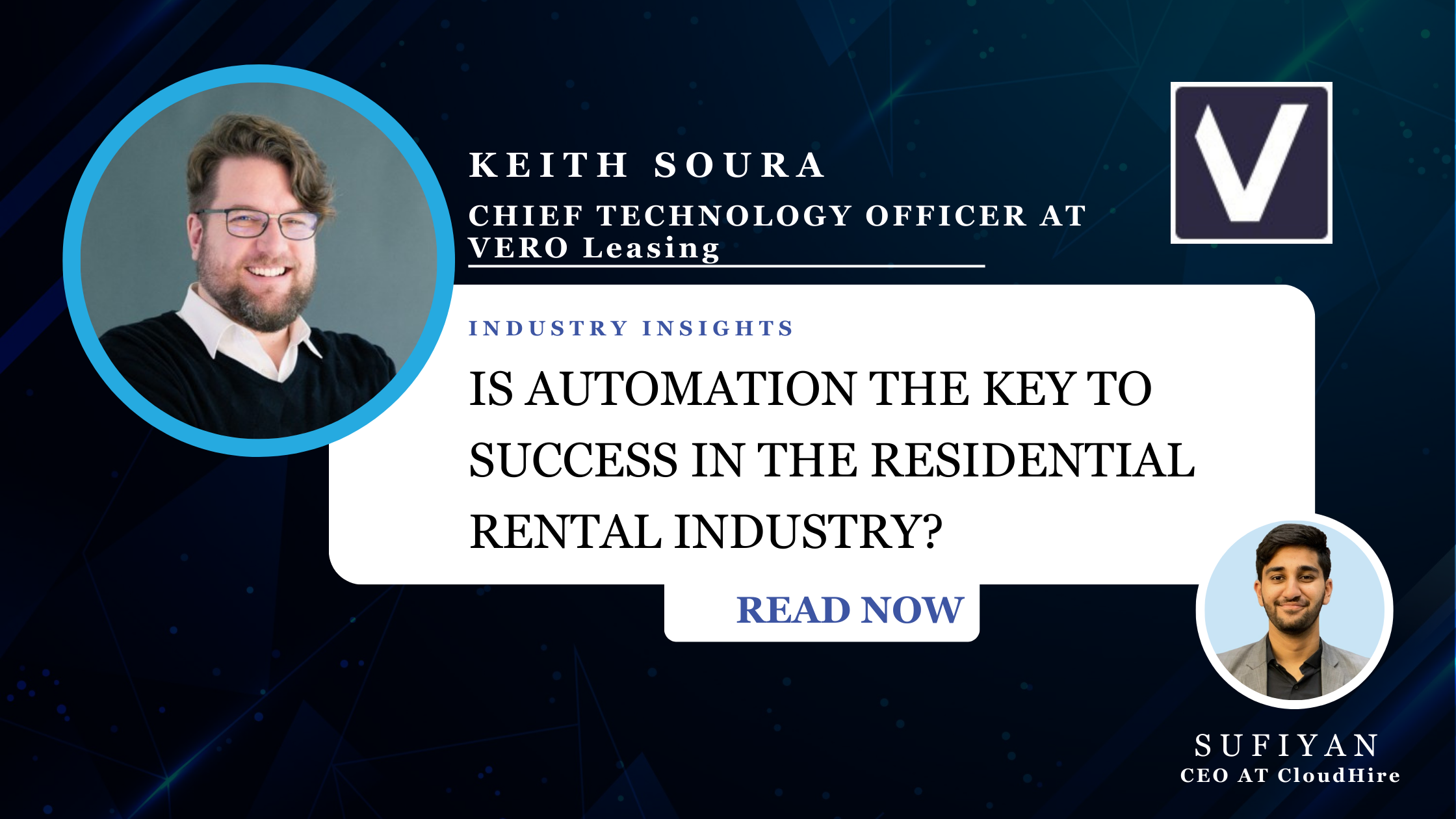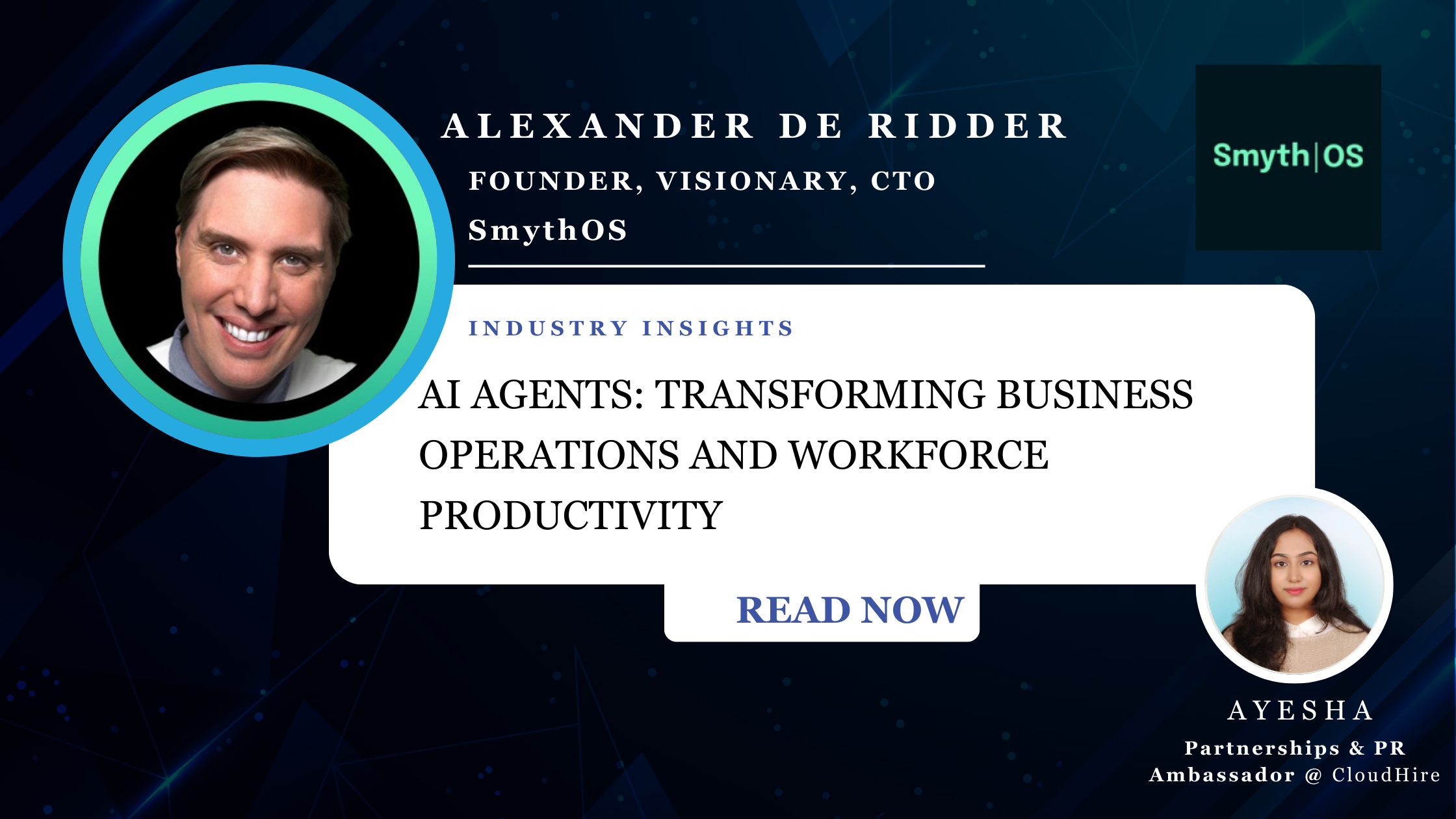Integrating AI, automation, and data processing is transforming how businesses operate in the rapidly evolving landscape of residential rentals and risk analytics. This transformation is particularly evident in the work being done by industry leaders like Keith Soura, who is the CTO of Vero, and Sufiyan Ishaq who leads CloudHire in their mission to help clients create a significant and unique increase in their value by building a organization that attracts, develops, and retains outstanding people. Keith has pioneered innovative approaches to underwriting and data management. As AI becomes increasingly central to these processes, understanding how to balance automation with human oversight, ensuring compliance with regulations, and maintaining data accuracy is crucial.
Introduction to Vero and Its Unique Approach
Vero’s specialization in underwriting for residential rental real estate sets it apart in a crowded market. The company’s approach to data processing and consumer data ownership is designed to address some of the most pressing challenges in the industry. By focusing on rapid feedback models and maintaining strict compliance with housing regulations, Vero is not just keeping up with the competition—it’s leading the charge in redefining how underwriting is done.
The emphasis on data processing within Vero is a clear differentiator. Unlike many competitors who might rely on rigid AI applications or fixed-path models, Vero’s commitment to consumer data ownership and permissions ensures that its processes are both flexible and consumer-centric. This approach not only builds trust but also aligns with the increasing regulatory scrutiny around data privacy and the ethical use of AI.
Differentiation Through Data Processing
One of the key strategies that set Vero apart is its advanced approach to data processing. In an industry where rapid, accurate decision-making is essential, the ability to process and analyze vast amounts of data quickly gives Vero a competitive edge. The company’s models are continuously refined through a robust feedback loop. They bring in subject matter experts to help train the AI system, allowing the computer “brain” to iteratively improve and deliver increasingly accurate and error-free results over time. This ensures that the insights drawn from the data remain relevant and precise.
This data-driven approach is particularly important in the context of underwriting, where even small errors can lead to significant financial consequences. By focusing on consumer data ownership and permissions, Vero not only differentiates itself from competitors but also adheres to best practices in data ethics. This focus on ethical data use is increasingly important as consumers become more aware of how their data is used and as regulations around data privacy become more stringent.
The Role of Compliance and Model Accuracy

Model accuracy and compliance with housing regulations are two pillars of Vero‘s operational strategy. In the highly regulated field of residential rentals, ensuring that underwriting models are both accurate and compliant with local, state, and federal regulations is non-negotiable. Vero’s models are designed to predict risk with a high degree of accuracy, a crucial factor in making sound underwriting decisions.
Legislation plays a critical role in shaping these models. Vero’s team works closely with ownership groups to refine their models based on real-world performance data. This iterative process is key to maintaining both accuracy and compliance, ensuring that the models are not only effective but also aligned with the latest regulatory requirements. This approach also highlights the importance of human oversight in a process that could easily become overly reliant on automation and AI.
The feedback loop Vero maintains with ownership groups is particularly valuable. By constantly refining their models based on real-world data, Vero ensures that their underwriting processes remain both effective and compliant. This iterative approach is essential in a field where regulations can change quickly, and staying ahead of these changes is crucial for long-term success.
Scaling Challenges and Overcoming Norms

As Vero has grown, it has encountered a series of challenges typical of companies in the scaling phase. These challenges include finding the right market fit, training new employees to maintain high standards, and overcoming established industry norms that can be resistant to change.
- Achieving the right market fit is critical for any company looking to scale. For Vero, this means ensuring that its underwriting models and services meet the specific needs of the real estate market. This requires a deep understanding of the nuances of different markets and the ability to adapt quickly to changing conditions. In an industry where one-size-fits-all solutions rarely work, Vero’s ability to customize its offerings is a significant competitive advantage.
- Training people is another major challenge when scaling a business. Soura mentions that training people internally isn’t that much of a challenge. It is training the employees of a company you’re dealing with who have been in the industry for several years – maybe 20 or more – and are now in a decision-making position. Getting them to change their traditional method of thinking is completely another battle that is tough but not impossible.
- Overcoming established norms in the underwriting industry has perhaps been Vero’s most significant challenge. Traditional practices, such as using gross income for underwriting decisions, are deeply ingrained in the industry. Vero’s innovative approach often requires changing these established norms, a process that can be time-consuming and complex. Legal assistance is often necessary to change existing covenants that are based on outdated data, highlighting the need for a strategic approach to innovation in this highly regulated field.
Addressing complex challenges becomes easier with a well-coordinated team that executes flawlessly. Ensuring the right people is half the battle, but building a successful team can divert attention from pressing matters, leading to compromised results or delays. It helps if you find a service like CloudHire to set up a department or source skilled individuals allowing you to focus on core issues while outsourcing team-building.
The Cautious Integration of AI

In the digital age, AI and automation are increasingly being integrated into business processes across industries. However, Keith Soura has expressed caution about the use of AI in underwriting, particularly due to the need for explainability and accountability in decision-making processes.
The integration of AI into underwriting offers many potential benefits, including increased efficiency and the ability to process vast amounts of data quickly. However, these benefits must be balanced against the risks of relying too heavily on automated systems. In an industry where decisions can have significant consequences on the basic rights of people, it is crucial that AI-driven processes are transparent and that the rationale behind decisions is easily understood.
Vero’s approach to AI is measured and deliberate. The company uses AI to enhance its operations but ensures that there is always a human in the loop for sensitive decisions. This hybrid approach allows Vero to leverage the efficiency of AI while maintaining the human oversight necessary for making informed, ethical decisions.
Soura elaborates on how the company has implemented a “human in the loop” system for its rental application process. The goal is to make the process as automated as possible, with around 73-80% of applicants able to be fully approved or declined through the automated system.
However, they recognize that complete automation is not feasible or desirable, especially in the housing industry where everyone has the right to apply. They have built the system with the capability to be done manually end-to-end, and then have gradually automated portions of it.
The reasoning behind this approach is:
- Having a random sampling of automated decisions reviewed by humans, in case any issues slip through.
- Ensuring accessibility for all applicants, even those with disabilities that prevent them from using the website.
- Maintaining the ability to peel back automation if needed, rather than having a rigid fully automated system.
Overall, the focus is on incrementally automating where possible, while always preserving the option for manual human intervention to ensure a fair and inclusive process for all rental applicants.
Keith has emphasized the importance of understanding both the strengths and weaknesses of AI. While AI can be a powerful tool for processing data and making predictions, it is not infallible. Blindly relying on AI without a deep understanding of its capabilities can lead to poor outcomes. Vero’s approach, which balances AI-driven insights with human judgment, helps mitigate these risks.
Sufiyan adds how CloudHire optimizes the use of AI to find the best talent globally. At the same time, brings in the expertise of professionals who lead this search to compliment AI where it falls short. Thus, getting the top 1% of talent to their clients.
The Importance of Data Verification – Is automation enough?

Data verification is a critical component of Vero’s operations. Ensuring that the data used in underwriting models is accurate and reliable is essential for maintaining the integrity of the models and the decisions they inform. Vero’s approach to data verification involves a combination of advanced technology and human oversight, a strategy that is increasingly common in data-driven industries.
Automation plays a significant role in Vero’s data processing, allowing the company to handle large volumes of data quickly and efficiently. However, automation alone is not enough to ensure data accuracy. Vero supplements its automated processes with rigorous human oversight, ensuring that the data used in its models is clean, accurate, and relevant.
This approach to data verification is shared by other companies in the industry, including CloudHire, a global recruitment firm led by Sufiyan Ishaq. Like Vero, CloudHire faces challenges in data verification and automation, particularly in ensuring that the data used in its recruitment processes is accurate and up-to-date. For both companies, the goal is to leverage technology to improve efficiency while maintaining the accuracy and reliability of the data. By combining technology with human oversight, both Vero and CloudHire ensure that their data-driven decisions are sound.
Budget and Resource Allocation – Is automation FREE?

Effective budget and resource allocation are critical to the success of any business, particularly those looking to scale. At Vero, a significant portion of the budget is allocated to research and development (R&D), a strategy that allows Vero to continuously improve its underwriting models and services, ensuring that they remain at the cutting edge of the industry. This focus on innovation is critical for differentiation in a market where competitors are constantly seeking to catch up. By prioritizing R&D, Vero ensures that its technology and processes are always evolving, allowing the company to scale more effectively and maintain its leadership position.
While automated platforms may seem cheap upfront, Soura and Sufiyan highlight that the true costs arise from deeply embedding these systems and training custom models. Sufiyan experienced this firsthand when building CloudHire’s infrastructure and its AI-powered Recruitment Platform – Cloudy Recruiter. This underscores the importance of budgeting and resource allocation when implementing automation, as the downstream expenses can quickly outweigh initial perceptions of low or “free” costs.
The allocation of resources is also critical in managing the challenges of scaling. As Vero expands, it must carefully allocate resources to ensure that its operations remain efficient and that the quality of its underwriting models is maintained. This requires a strategic approach to budgeting, with a focus on long-term goals and the flexibility to adapt to changing market conditions.
Conclusion
The integration of AI, automation, and advanced data processing is reshaping the landscape of residential rentals and risk analytics. Companies like Vero, under the leadership of Keith Soura, are at the forefront of this transformation. They demonstrate how these technologies can be used to enhance efficiency, accuracy, and compliance.
However, the journey is not without its challenges. By maintaining a strong focus on research and development and ensuring that human oversight remains a key component of its operations, Vero has positioned itself as a leader in the industry.
As the market continues to evolve, the lessons learned from Vero’s experience provide valuable insights for other companies looking to navigate the complexities of AI integration and scaling. Whether in residential rentals, underwriting, or beyond, the principles of innovation, accountability, and continuous improvement remain key to long-term success in an increasingly data-driven world.








